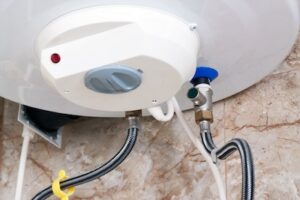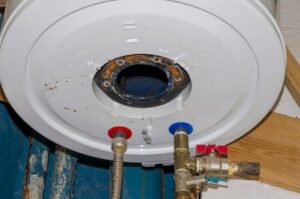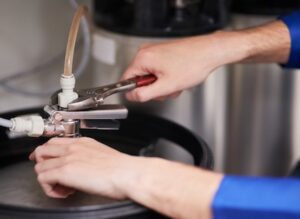Why Is My Hot Water Heater Leaking & What to do Next?
Nothing is worse than finding a puddle of water around your water heater. It’s another mess to clean up, and the sinking feeling you get pondering how much money you’ll have to put into fixing it can be nauseating. Also, you may be wondering why is my hot water heater leaking and what to do next.
The reasons why your hot water heater is leaking are usually due to a leak in the Temperature and Pressure Relief Valve or the drain valve, or even a crack in the tank. The most important thing you can do is to stop the water flow. To save you from future leaks and other problems, it’s important to know what might be causing the issue.
In this article, we’ll review how a water heater works, some common causes of leaks, how to fix them if they’re small or if you need water heater repair service, and how you can try to prevent further issues.

What to Do If Your Hot Water Heater Is Leaking
So, if your water heater is leaking, don’t worry! Do not freak out. Let yourself calm down. Sometimes you can let your emotions get the best of you. Just follow these easy troubleshooting steps and you’ll be back to normal in no time. We’ve even included some solutions for easy repairs if you’re feeling confident.
1. You Need to Know If Your Water Heater Is Leaking Water
You’ll first want to determine if the moisture is actually from a leak or just condensation. If it’s only condensation, there’s no need to worry–this often happens when the water heater is very hot, but the room it’s located in is cold.
- You can test for this by wiping down and drying your water heater, then closely examining its exterior.
- Condensation is generated when moisture is evenly distributed over a surface.
- To check if this is the case in your home, put paper towels on the ground near potential sources of leaking water, such as your water heater or HVAC system.
If these appliances are indeed leaky, you’ll be able to tell by observing which paper towel soaks up the moisture first.
2. Shut Off Power
If you have verified that your water heater is, in fact, leaking water, the next step is to turn off its power source. It would be unsafe to work on an electric water heater while it’s still plugged in, so make sure to find the circuit breaker and flip the switch for the water heater.
- If you have a gas water heater, there should be a dedicated shutoff valve near the base of the tank by the gas line that you can use.
- Once you’ve turned off the power, give the water a few minutes to cool down if it was hot. You’ll be draining the tank later on, so there’s no need to worry about scalding yourself.
3. Turn Off Cold Water
The next step is to block the cold water supply from entering your water heater.
Most water heaters have a valve on the inlet pipe of the cold supply. Sometimes blue (cold) or red (warm), this provides the tank with a chillier stream of water.
- The outlet pipe then carries hot liquid from the machine into homes.
- If these pipes are not color-coded, you can tell which one is which by feeling them both–one should be cooler to touch than the other.
- If your water heater is located near the main water shutoff valve for your home, this will be easy. Just turn the handle to the “off” position.
If there’s no shutoff valve near your hot water tank or you’re not sure which one controls the cold water inlet, don’t worry! There’s an alternative method that will work just as well.
- Find the water heater’s cold water inlet pipe and locate the clean-out plug on the tank’s side. This is a brass or plastic cap that covers a small drain hole.
- Unscrew the plug with a wrench, then allow any water inside to drain out into a bucket until the stream trickles to a stop.
This will effectively block the cold water supply from entering your tank, even if there’s no shutoff valve nearby. If none of this works try to turn off the water mains. It is better to not have water in a flooded home.
4. Where Is the Water Leak?
Let’s get down to business. Once you turn off your water and power source, it’s time to find the source of the leak so you can correctly troubleshoot and repair it. Try identifying where the water accumulates one day and clean it up. Then, if you notice an accumulation of water in the same place again tomorrow, start there when troubleshooting your water heater leaking issue.
There are 3 main areas where leaks commonly occur:
1. The Temperature and Pressure Relief Valve
- The T&P valve is a safety feature that helps relieve pressure if the water in your tank gets too hot or if there’s too much pressure build-up.
- It’s usually located on the side of the tank near the top and has a pipe connected to it that goes down into a drain.
- If this valve is leaking, water will drip from the valve itself or the pipe attached to it.
2. The Drain Valve
- The drain valve is located near the bottom of the tank and is used when you need to empty it, such as when you’re cleaning it.
- If this valve is leaking, water will drip from the valve itself or the pipe attached to it.
3. A Crack In the Tank
- A leak in the hot water tank itself is usually caused by corrosion.
- Over time, the hot water and pressure inside the tank can cause it to weaken and develop cracks.
- If your tank is leaking from a crack, you’ll need to replace the entire tank.
- Once you’ve determined where the leak is coming from, you can move on to fixing it.

5. How to Fix Leaking Hot Water Heater
Once you have located the source of the leak from your hot water heater, you need to take action to stop it from continuing to do so. Here are some different solutions for different sources of the leaking:
If The Water Leak Is At The Top of The Heater, You Need To Check the Pipes
The two pipes located on the top of your water heater are responsible for bringing water into the tank to be heated and then out into your home. If their fittings or connections are loose, this could be causing a leak at the top of your heater. To fix this problem, simply tighten the pipes with a pipe wrench. If that doesn’t solve the issue, you may need to replace the pipes entirely.
If The Side or Bottom Is Leaking: Check The Temperature & Pressure Relief Valve
The Temperature and Pressure Relief Valve, or T&P valve, is a safety measure located on every water heater. If the pressure builds up to a concerning level, the T&P valve will release water to relieve that pressure.
- If you see some leakage from the valve, check your water heater’s temperature setting first. If it’s set too high, turn it down to 120 degrees Fahrenheit.
- If the leakage continues, you may need to replace the valve entirely.
If your heater is set at this temperature but you still see leakage, then chances are you have a faulty valve that needs replacing by a professional. Try To get the HVAC Specialist over as soon as possible.
If Water Is Leaking Out of the Drain Valve
The drain valve, located at the bottom of your water heater, is used for draining the unit during maintenance. If you notice leaking from the bottom of your water heater, ensure that this valve is fully closed.
- If it continues to drip despite being shut tightly, it may be loose.
- Give it a slight tighten with a pipe wrench. If leakage persists after troubleshooting, you might need a replacement drain valve.

If It Is Leaking Out of the Base
- If you have water near the base of your water heater, it may be because there is a crack in the tank.
- You will need to replace the entire unit if you want to fix the problem.
Dry Up the Water
- Water is often the root of several problems, such as warping structures or damaging belongings.
- It can also attract insects and mold! To avoid any further water damage, clean it up as soon as possible!
Call the HVAC Pro
- If you can’t stop your water heater from leaking after trying to fix it on your own, always contact an HVAC Pro.
- A professional is sometimes the only one who knows how to make your water heater work again.
- Try your best to turn the water mains off at least until they are able to arrive; if not, your home could get extremely wet.
Conclusion
Water heater leaks can cause a lot of damage if not fixed immediately. The most important thing you can do is stop the water flow. Try your best to stay calm and clear your mind. Most people think better on their feet when they are not overwhelmed with emotion. During a time like this, it can really be hard to stay calm.
Being aware of where your home’s main water shut-off valve is located is crucial so you’re able to turn it off quickly in an emergency. If you have no idea how to fix the problem, always contact an HVAC professional! They would be more than happy to help and get your water heater working again as soon as possible. This is essential, as hot water and heat are important in the Winter.
